Download our latest report
Thai family businesses can’t afford to lose trust if they want to secure their legacy.
Family business has always been the backbone of Thailand in contributing employment, industry development and entrepreneurial training in the economy. Their success in overcoming challenges in the new normal stems from strong trust, built over generations, with three key stakeholders: customers, employees and family members.
However, rapid digitalisation, environmental impacts and changing demographics have dramatically changed how Thai family businesses build and nurture trust.
Our survey findings show that Thai family businesses performed reasonably well over the last financial year with 59% experiencing growth and 14% having lower sales. This is a better performance than 2021 at 39% growth and 31% sales reduction. But, when compared to global peers, the situation is slightly less positive.
To preserve their legacy in the long-term, family businesses must build trust in a new way by changing their practices and consider new priorities to reach out to three key stakeholders: customers, employees and family members. Beyond these groups, it is also essential for Thai family businesses to expand the trust quotient to include the general public.
PwC’s 11th Global Family Business Survey: Thailand Report interviewed 2,043 family business leaders in 82 countries and territories, including 44 respondents from Thailand. The online survey was conducted between 20 October 2022 and 22 January 2023.
Figure 1: Growth in Thai family businesses has increased compared to previous years.
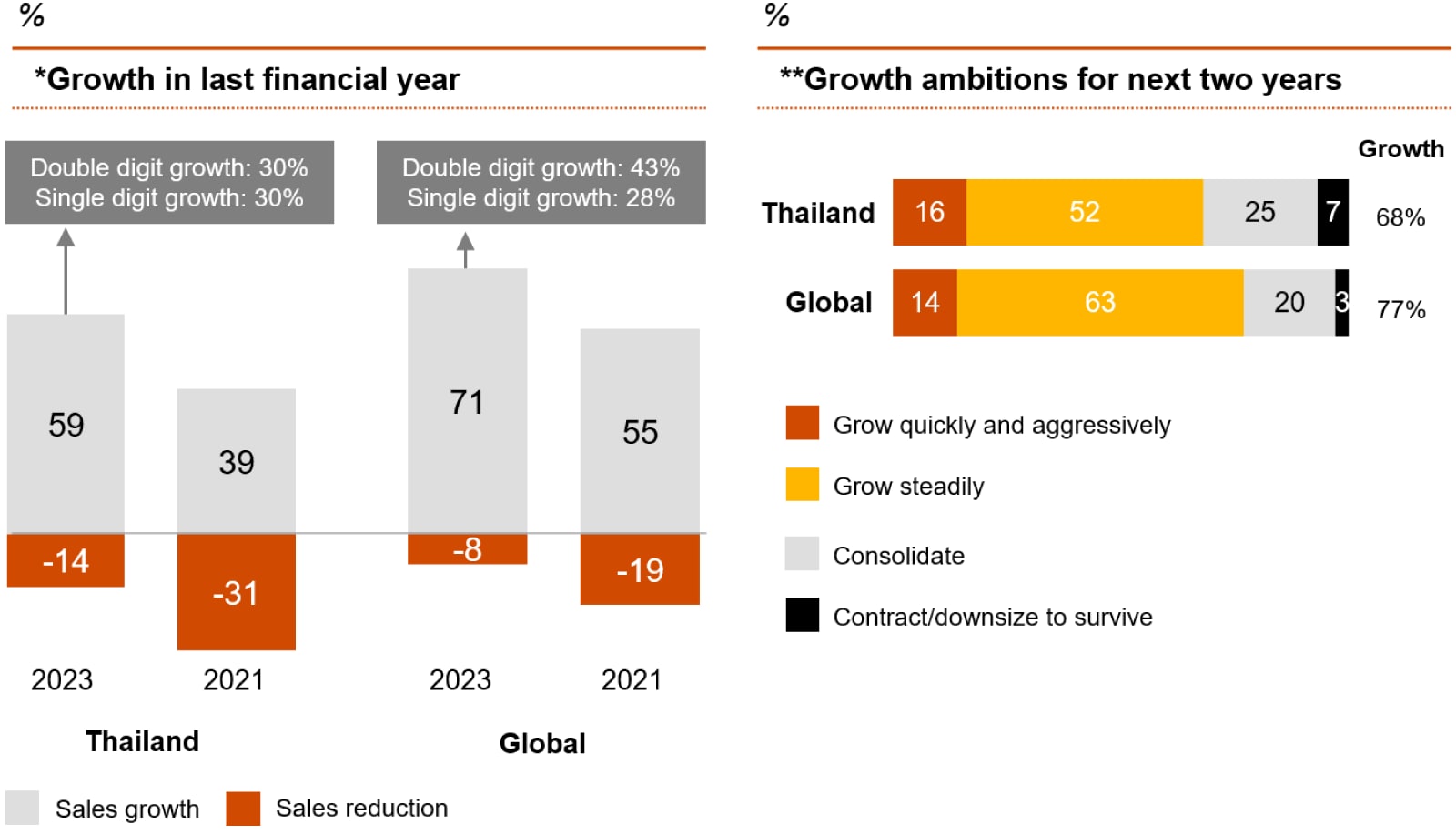
*Q: Looking back over the last financial year would you say your sales have been: **Q: Which of the following best describes your company’s ambitions for the next two years? Source: PwC’s 2023 Family Business Survey
Like global counterparts, Thai family businesses are optimistic about growth and expansion.
68%
expect to grow in the next two years (Global: 77%).
16%
expect to grow quickly and aggressively (Global: 14%).
64%
say their top key priority is expanding into new markets (Global: 51%).
Trust levels among the three key stakeholders are also positive for Thai family businesses.
57%
are fully trusted by customers (Global: 51%).
53%
are fully trusted by employees (Global: 46%).
72%
are fully trusted by family members (Global: 74%).
However, Thai family businesses must do a better job at securing trust with the stakeholders since only 23% say they are very advanced in the implementation of a system to gather customer feedback (vs. 34% globally). Simultaneously, only 20% of respondents say there is a high level of trust between family members outside the business and family members working in the business (vs. 40% globally).
Figure 2: Thai family businesses aren’t taking necessary actions to build trust.
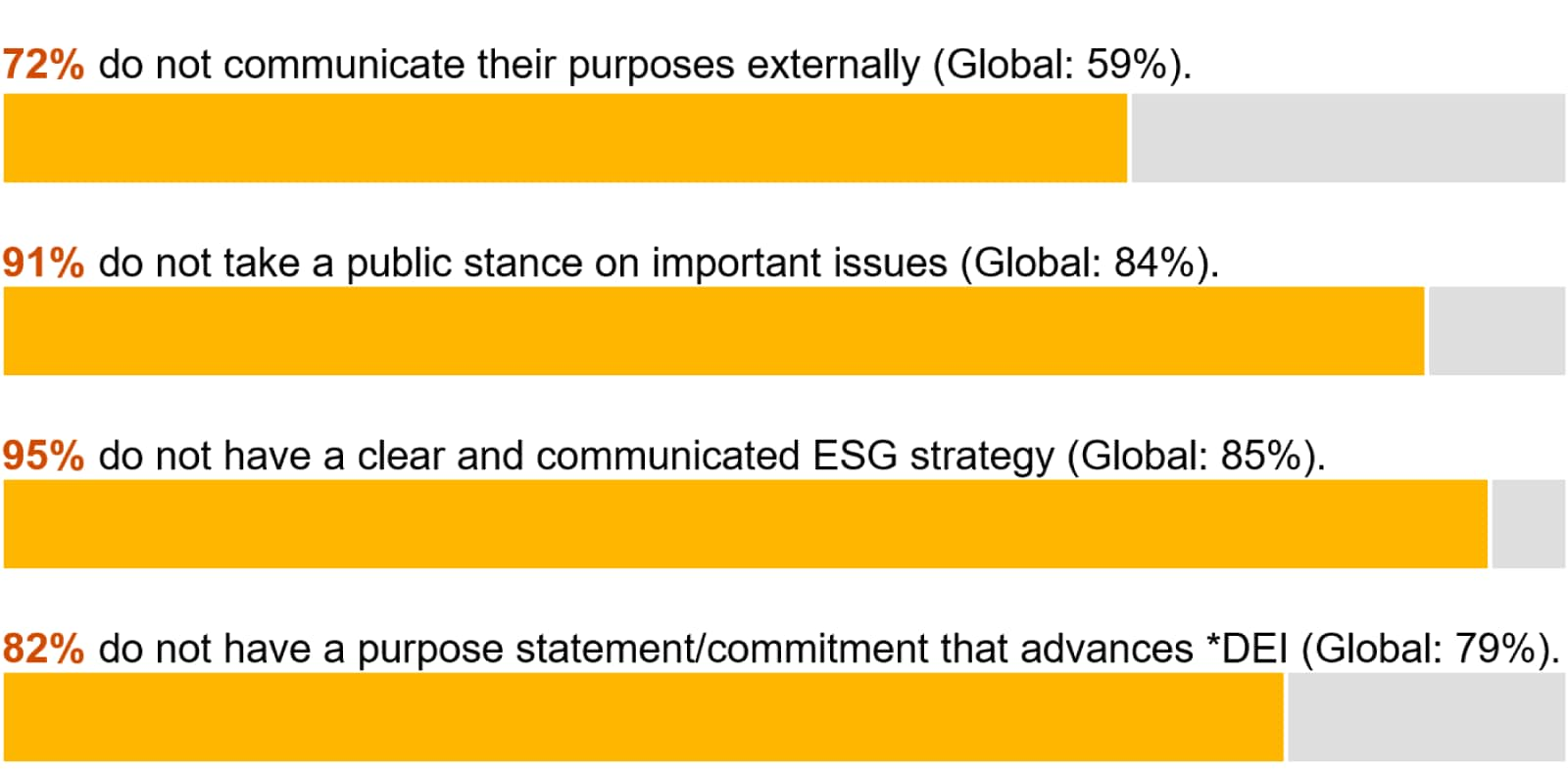
Q: Which of the following best describes what actions your company is taking in these areas? *Diversity, equity and inclusion Source: PwC’s 2023 Family Business Survey
Reimagining the trust formula
The above figures indicate that although trust levels in Thailand are high and in line with global peers, Thai family businesses are still at risk of losing trust if they don’t transform. Specifically, there is room for improvement to build trust such as incorporating ESG into business strategy, advancing digital transformation and having a clear commitment for diversity, equity and inclusion (DEI).
The report also suggests that family businesses can no longer solely rely on their legacy as today’s key stakeholder groups have different views and expectations on what builds trust and their priorities are changing.
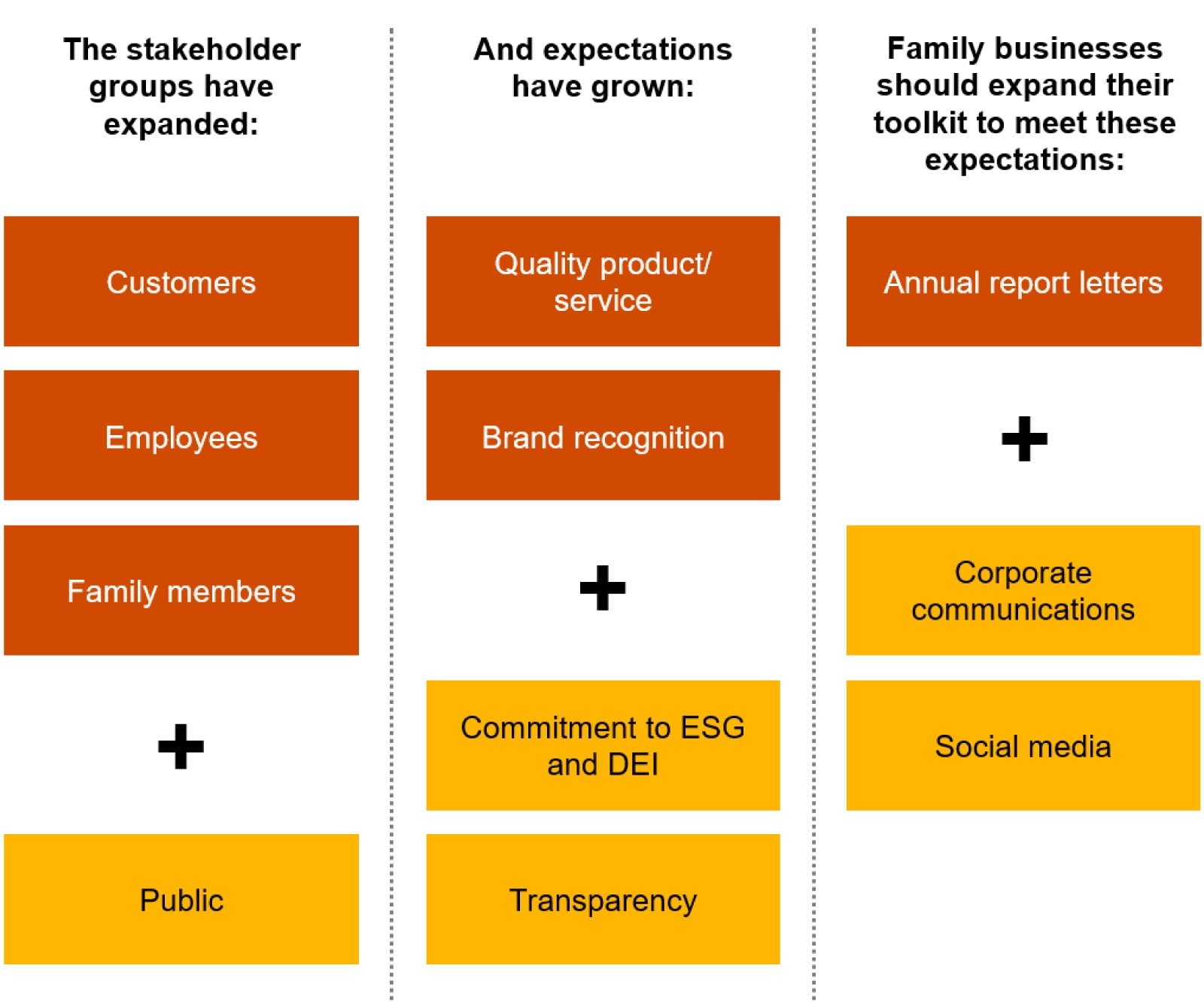
Source: PwC analysis
But building trust has never been easy and will require transformation. This includes revisiting practices, policies and governance to ensure Thai family businesses successfully build, protect and nurture trust with their important stakeholders. Our report dives deep into what actions are required to build trust with customers, employees and family members.
Transform to build trust: Customers
Customers are the lifeblood of family business and their needs will always impact on how family businesses operate, from product development to services. Like global (42%), 48% of Thai family businesses plan to focus on increasing customer loyalty, indicating that almost half understood the importance of keeping customers coming back for more. In addition to the fact that loyal customers are more likely to repeat purchases, they are also more likely to advocate or recommend a brand they trust to potential new customers.
Figure 3: Increasing customer loyalty is the second highest priority for Thai family business in the next two years.
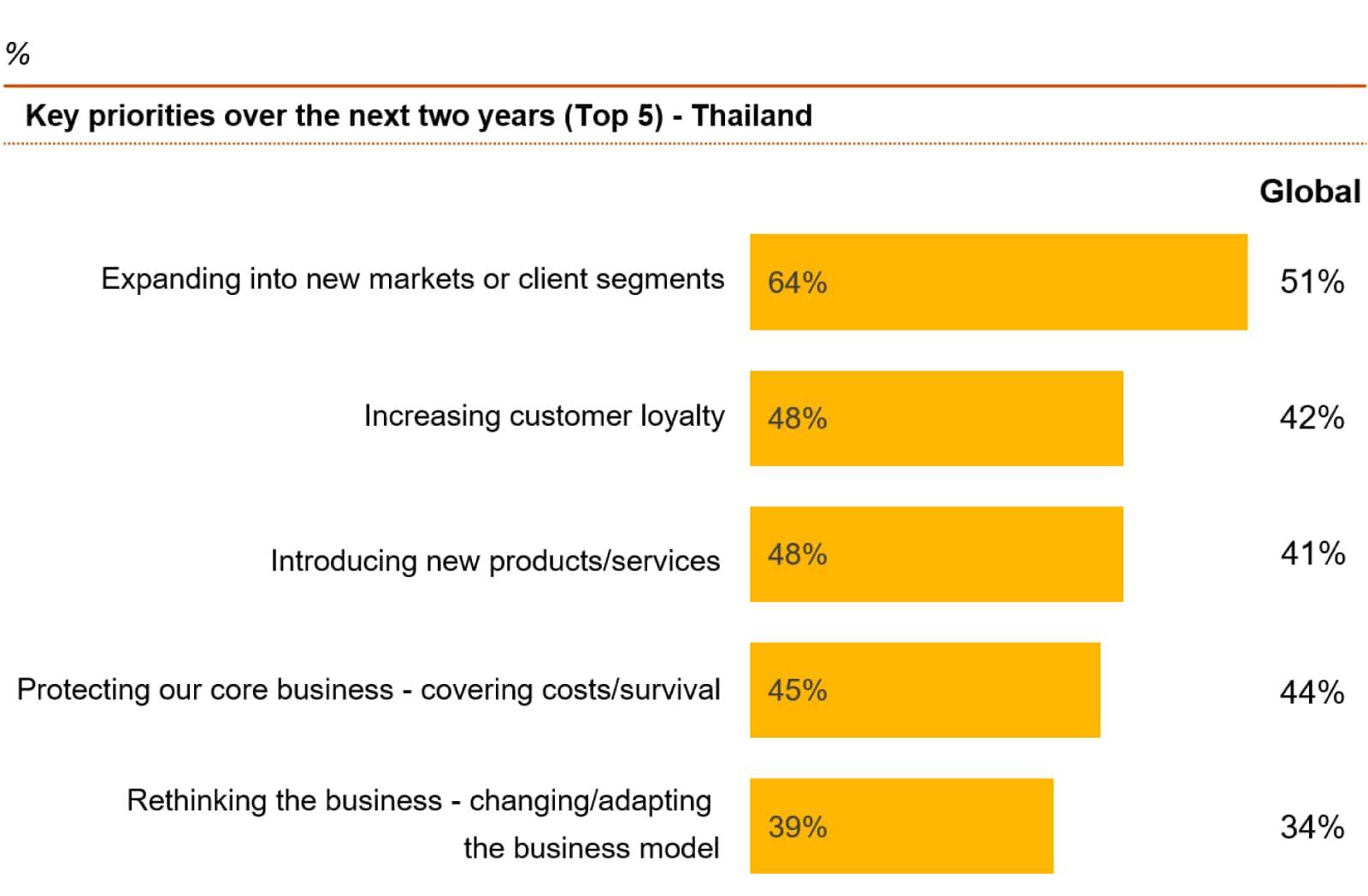
Q22. Which, if any, of the following are the company’s top five priorities for the next two years?… Source: PwC’s 2023 Family Business Survey
Integrating ESG to foster purpose-driven business
In an age where sustainability has become an important issue to society, consumer behaviours are making sustainability a key consideration. According to our
2023 Global Consumer Insights Pulse Survey of 9,180 consumers across 25 countries, including Thailand, more than 70% of global consumers are willing to pay more for food products with ethical practices.
In the June 2021 edition, 76% of Thai consumers intentionally buy eco-friendly items with less packaging while 78% of home workers buy from companies that are conscious and supportive of protecting the environment.
Cultivating trust on the sustainability narrative means integrating ESG practices into business through communicating commitments to customers. However, many Thai family business survey respondents expressed low interest in ESG.
Figure 4: Many Thai family businesses admit that ESG and DEI are not a focus.
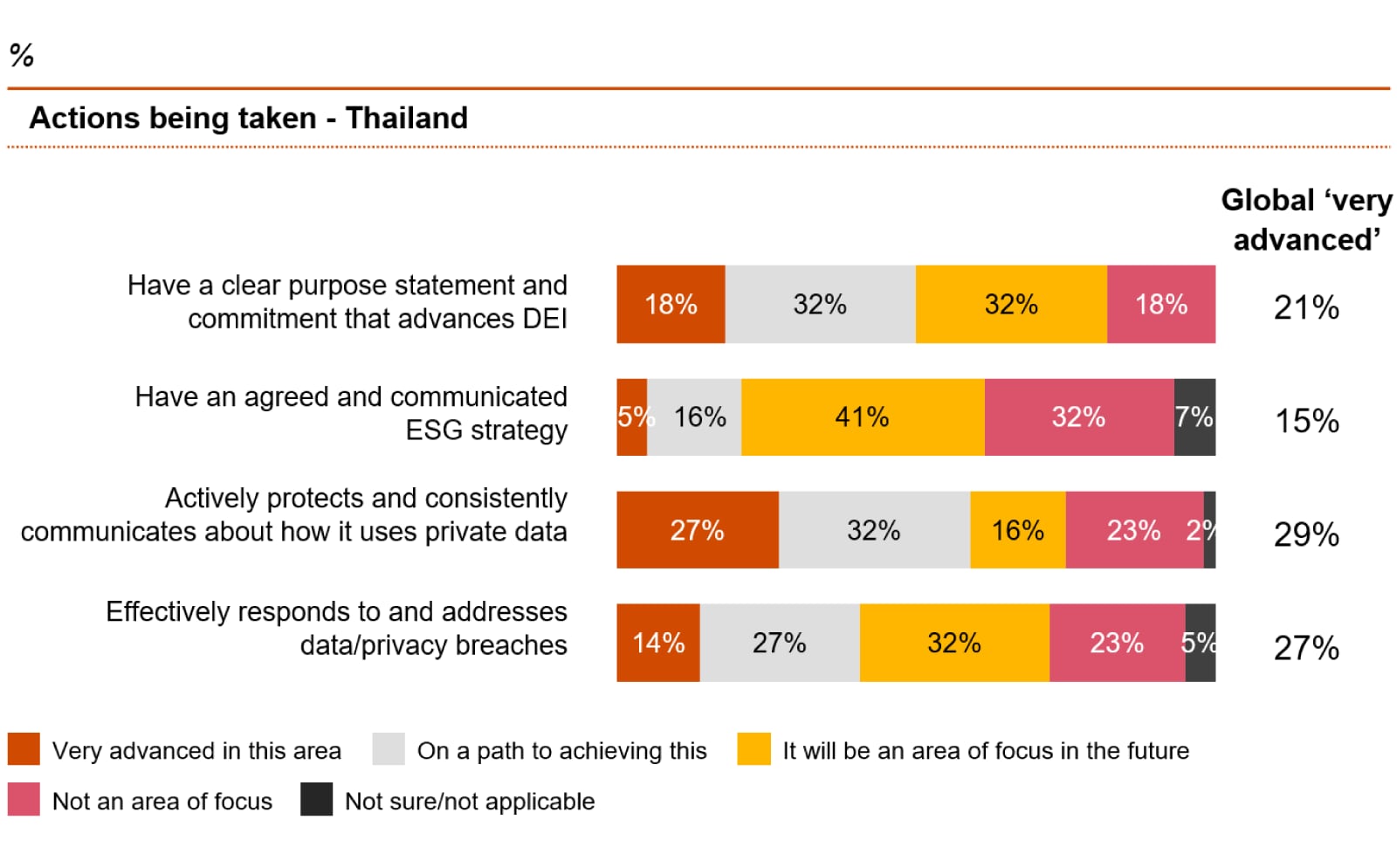
Q11. Which of the following best describes what actions your company is taking in these areas? Source: PwC’s 2023 Family Business Survey
According to the survey findings, only 5% of Thai family businesses agreed and communicated ESG, lower than global at 15%. At the same time, only 18% have a clear purpose statement and commitment that advances DEI. This indicates there is a lack of leadership when it comes to championing both areas.
ESG and DEI matter for consumers as they are becoming socially conscious when purchasing products and services that create lesser impact to the environment or have ethical values. Having a clear ESG and DEI commitment can create a positive outlook, leading to cultivating trust with new customers as well as retaining trust with existing customers.
However, only 28% of Thai family businesses actively communicated the company purpose externally, slightly higher than their global peers of 21%. This is a clear indication that family business leaders must quickly act to communicate their purpose as a promise to the public, ensuring stronger confidence among their customers.
Digital transformation must continue to be a priority
Figure 5: Only 25% of Thai family businesses have strong digital capabilities, significantly lower than global at 42%.

Q30. How strongly do you agree or disagree that… Q22. Which, if any, of the following are the company’s top five priorities for the next two years?… Source: PwC’s 2023 Family Business Survey
Businesses around the world are accelerating their digital transformation journey to streamline operations and use data to tailor customer-centric experience. Thai family businesses understand the importance of digitalising their organisation but still lack digital capabilities when compared to their global peers.
One in four of Thai family businesses surveyed say they’re confident in digital capabilities. Taking a closer look at key priorities, just 27% of Thai family businesses say improving digital capabilities is a business priority, lower than the 44% of global peers.
Data governance is also lacking, which is reflected in Figure 4 where 27% actively protects and communicates about the use of data while only 14% effectively respond to data or privacy breaches. Both figures are low, similar to their global peers at 29% and 27%.
According to PwC’s Digital Trust Insights 2023: The Southeast Asia Perspective, businesses across the region must quickly focus on data security and data privacy practices by integrating a privacy-first mindset and tools to strengthen customer trust. Family businesses that have confidence in handling data and privacy will be able to smoothly continue their digital transformation journey, building strong trust with their customers.
Transform to build trust: Employees
Another important key stakeholder to build trust with is the employee. Family businesses that fail to gain and strengthen trust with employees will also be unable to earn trust with their customers. Therefore, trust must start within the organisation.
Figure 6: Less than half of Thai family businesses say being trusted by employees is important, lower than global at 68%.

Q26. How important is it that your company is trusted by the following stakeholder groups? Source: PwC’s 2023 Family Business Survey
Although 53% of Thai family businesses believe they are fully trusted by employees, only 43% feel that it is important to be trusted by employees, which is lower than their global peers at 68%. Although the figure suggests there is an established trust between family businesses and employees, if looking deeper, there are actions that need to be taken when it comes to strengthening trust with employees.
Figure 7: Less than half of Thai family businesses actively communicate the company purpose internally.
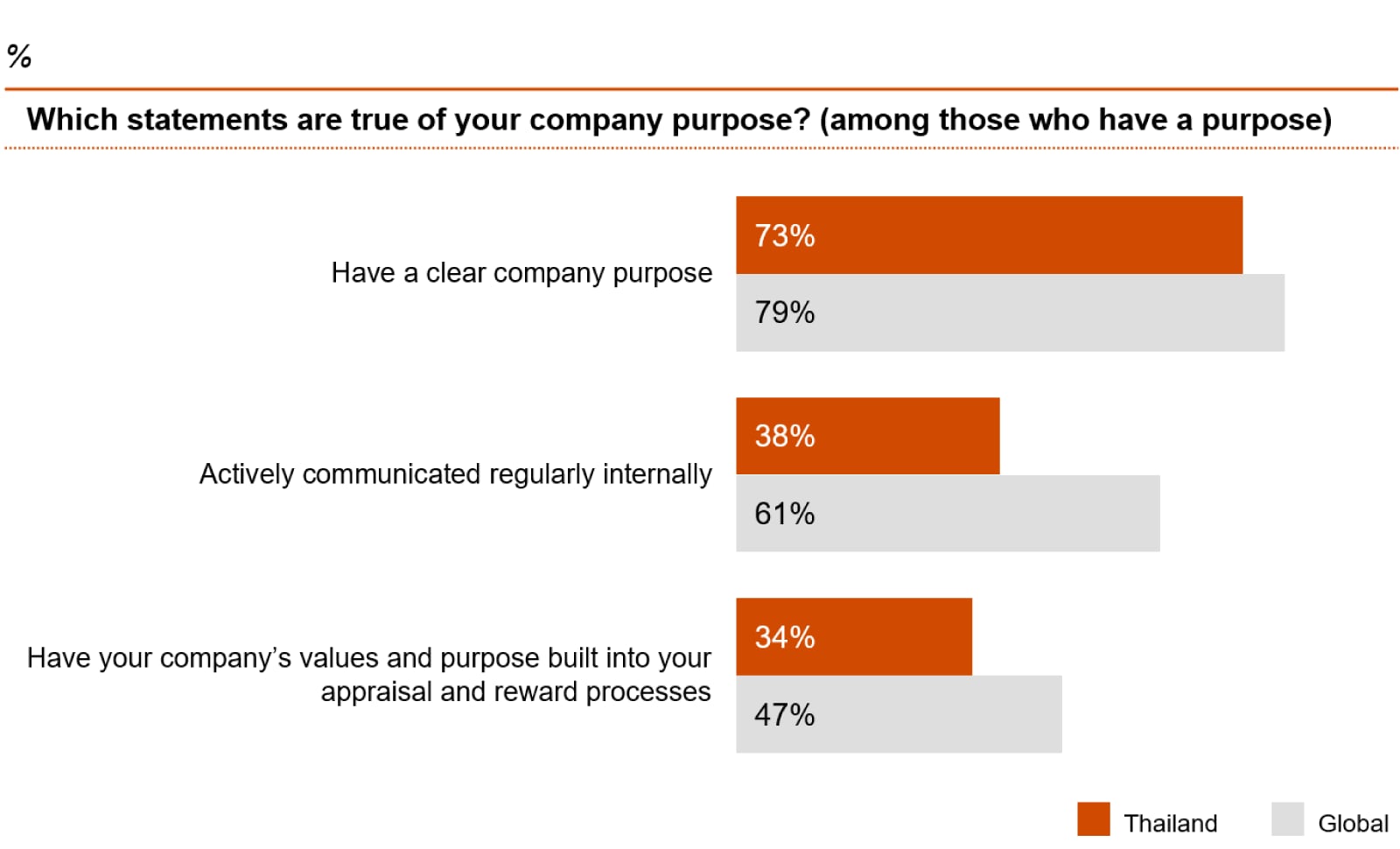
Q14. Which of these statements are true of your company’s purpose? Q15. Which of the following actions, if any, do you take to ensure that your purpose and values are being acted on within the business on a day-to-day basis? Source: PwC’s 2023 Family Business Survey
Family businesses need to actively communicate the company purpose and values internally if they want to maintain and build trust with employees. Some 73% of Thai family businesses claim to have a clear company purpose but only 38% say they actively communicate their purpose regularly internally. Meanwhile, just 34% of Thai family businesses have their company values and purpose built into their appraisal and reward processes.
Additionally, Thai family businesses can improve commitments to ESG practices which align with employees’ demand for greater transparency when the company deals with environmental impacts.
PwC’s Global Workforce Hopes and Fears Survey 2022 found that 23% of the surveyed global workforce said their company helps reduce environmental impacts. Workers want support for integrating ESG practices into their work. When looking at Thailand, just 18% of family businesses have a person or team dedicated to ESG agendas, much lower than the 43% of global counterparts. Similarly, committing to advancing DEI initiatives will help attract and retain key talent. Employees will appreciate companies that foster an inclusive workplace where they feel seen and valued.
Establishing a mechanism for accountability is also important to secure trust because it allows employees to have a voice inside the organisation. Of the Thai family businesses surveyed, less than half, or 47%, say there is an internal process for employees to appeal or question management’s decisions, though slightly less than global at 57%. This shows that there’s still room for improvement to provide accountability for family business employees in Thailand.
Transform to build trust: Family members
Our survey shows that 72% of Thai family businesses have a high level of trust between family members, like global family businesses at 74%. Despite this, conflict can happen when family members have different views or beliefs that clash, which could potentially derail established trust with all stakeholders.
The results also indicate that Thai family businesses prefer to handle within the immediate family (49%) and discuss issues openly (41%) with family members. However, only 18% say they apply conflict resolution mechanisms to resolve family disputes.
Figure 8: Conflicts are mostly handled within the immediate family rather than applying a conflict resolution mechanism.

Q32. Would you say family conflict within the business is something that:Q33. Which of the following (if any) describe how family conflict is handled in your company?…Source: PwC’s 2023 Family Business Survey
Dealing with conflict is a challenge when there are no formal governance structures. This includes shareholder agreements, family constitutions and protocols, and even wills.
Only 52% of Thai family business leaders surveyed have a clear or formal governance structure in place. This lack of formal governance structure could lead to being perceived as a business without purpose or value by family members, spreading distrust among other key stakeholders.
41%
have a clear set of agreed values and purpose (Global: 68%).
When there’s a lack of family values and purpose, communication between family members tends to become poor, creating misalignment between family members and the company’s direction.
48%
say there is alignment among family members (Global: 59%).
Furthermore, some types of family members do not receive the same trust. Thai NextGen family members (mainly aged 21 – 38) receive lower trust (20%) when compared to their global peers at 43%.
For the current generation in leadership positions, it’s not easy to let go of their business. In PwC Thailand’s NextGen Survey 2022, 57% of NextGens don’t think the current generation will retire soon while 43% believe it will be tough to earn the current generation’s trust. Allowing younger family members to engage in leadership roles will ultimately help prepare them to be responsible owners, ensuring the survival of the family business.
Figure 9: Trust is low between some types of family members.

Q27b. And how much trust would say there is between family members who are not on the board and family members who are on the board? Q36. How much trust would you say there is between:Source: PwC’s 2023 Family Business Survey
The lack of trust for certain types of family members and outsiders also reflects a lack of diversity among board members. A staggering 71% of Thai family businesses have only their family members on the board, almost double the percentage of global peers at 36%. This board composition, if not optimised for change, will fail to drive the business forward to the future as there are no members who can bring fresh perspectives to the business.
18%
have no women on the board (Global: 31%).
71%
have only family members on the board (Global: 36%).
27%
have no one aged under 40 on the board (Global: 57%).
23%
have no-one from a different industry background on the board (Global: 26%).
Transformation and Trust: A call to action for family leaders
Managing trust using the previous approach is no longer viable, it is up to family leaders to make changes that matter and respond to the priorities of customers, employees and family members, who have different needs and expectations on what constitutes and sustains trust.
The three key actions Thai family businesses should take to transform to build trust and ensure the longevity of their business are:
- Bringing clarity to ESG and DEI objectives. Family business leaders must pursue a clear ESG communication strategy, addressing important issues and bringing accountability to the public. This means regular communication and public reporting of the company’s ESG and DEI targets, which will convince customers, as well as internal stakeholders to get onboard with the company’s purpose.
- Empowering voices in the organisation. Empowered employees are likely to bring meaningful and fresh perspectives to the business. It means they can translate the company’s purpose to their work. Family business leaders must lead that empowerment by establishing an internal system that allows employees to question management decisions, creating a fairer workplace for internal stakeholders. The current generation should allow NextGen members to take on leadership roles, so they can implement their management skills and prepare themselves for future roles in the organisation.
- Upskilling digital capabilities. Upskilling digital capabilities is vital for family businesses to ensure their legacy survives. This means they must understand data and privacy management, which will enable them to be trusted by customers in handling their data. At the same time, data training and digital upskilling of employees and family members can empower these stakeholders to be confident using digital technologies while remaining careful in using data that benefits the family business.
There’s no one formula of success, but the message is clear: Thai family businesses must transform their organisations to build trust – this means establishing stronger communication, empowering voices in organisations and continuing their digital transformation journey, with customers, employees and family members.
“Embracing openness and diversity is another way to build trust and bring sustainability practices to the business. It will help family businesses experience different perspectives while attracting and retaining talented people for the organisation.”
About the Family Business Survey
The Family Business Survey is an international market survey of family businesses. The goal of the survey is to get an understanding of what family businesses are thinking on the key issues of the day. The survey polled 2,043 interviews across 82 countries and territories, out of which 44 came from Thailand.
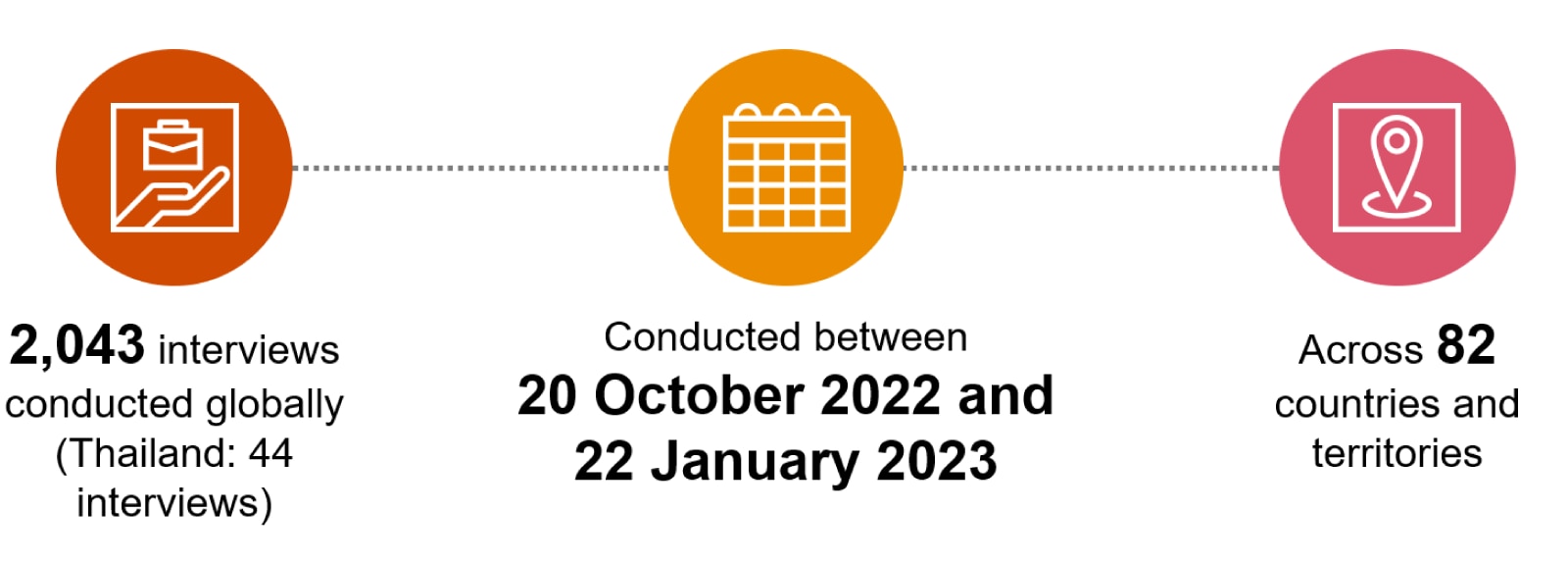
Take the survey with you
Click here to read Thai version
Contact us

Sinsiri Thangsombat
Entrepreneurial and Private Business Leader, Assurance Partner, PwC Thailand
Tel: +66 (0) 2844 1000







